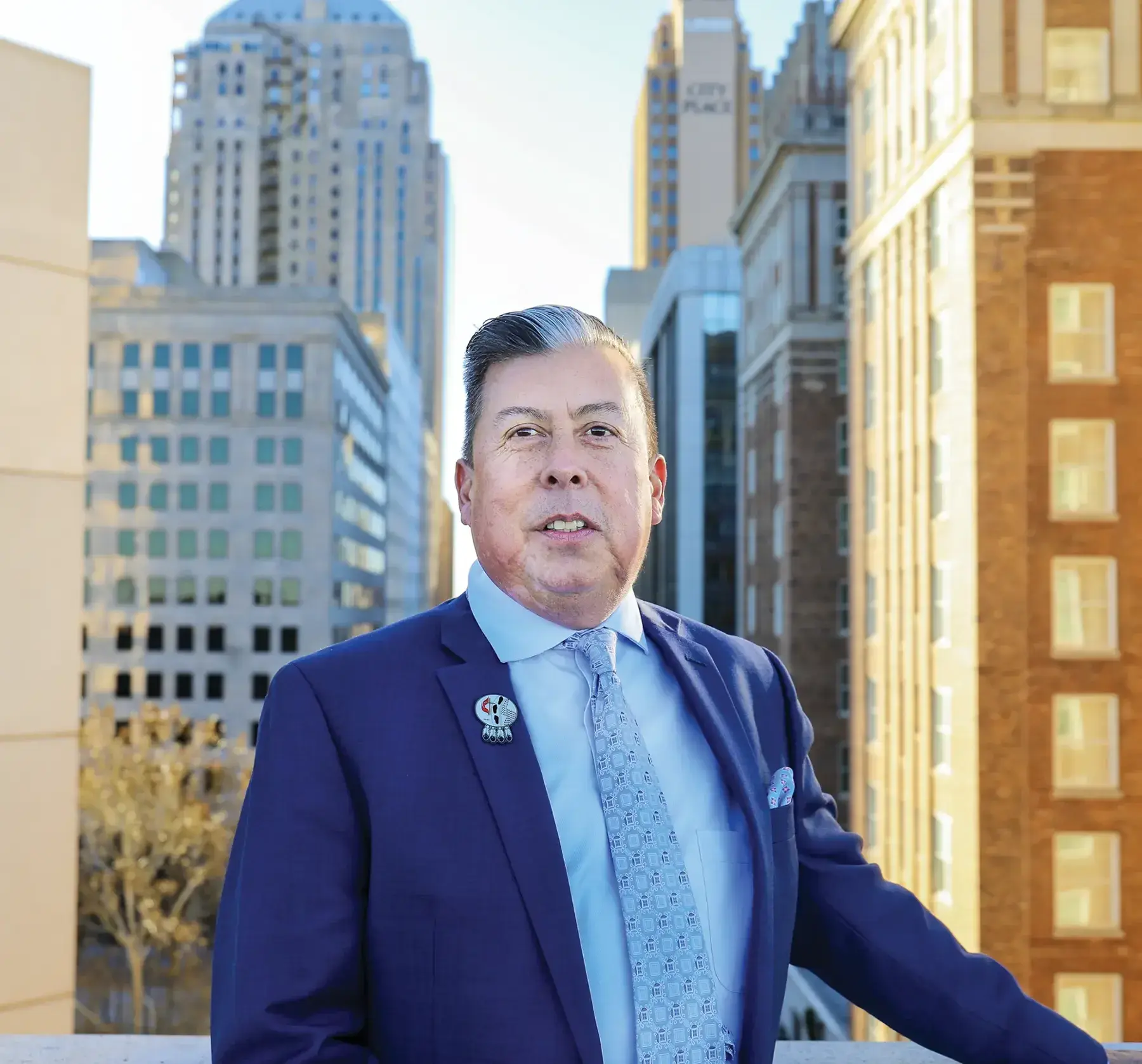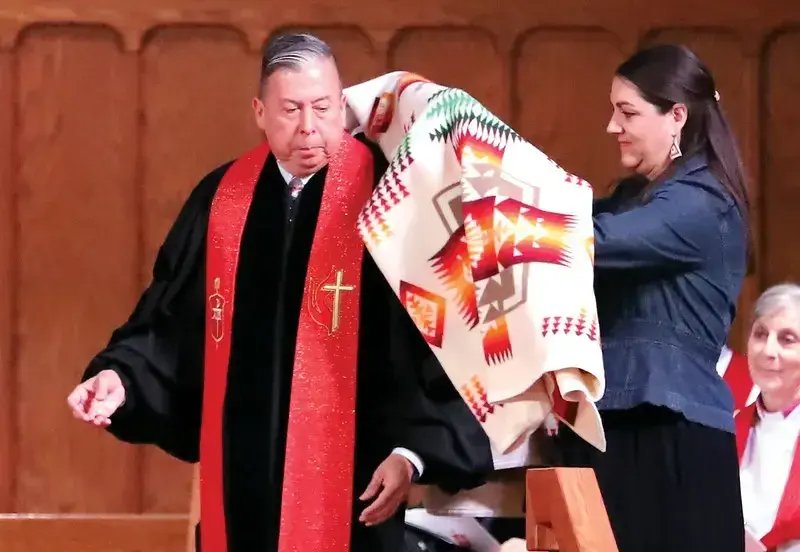David Wilson: A spiritual journey
An �鶹��ý alum’s path from the classroom to being the first Native American United Methodist Church Bishop
By Brian Daffron

Native American dance and ceremonial regalia is a blending of worlds. In many instances, raw materials such as feathers, wood and buckskin from the natural world combine with glass beads, cloth and metal from human-produced factories to create items as varied as feather fans adorned with beadwork, rattles made from silver cannisters and carved staffs of hardwood.
In a similar way, �鶹��ý City University alumnus and Choctaw tribal member David Wilson’s life finds itself as a syncretic blend of Methodist Christianity and an Indigenous spiritual worldview. His journey to this pathway began in Muskogee, �鶹��ý, where as a child Wilson attended a Methodist church, whose membership was predominantly Native. It is also, according to Wilson, the roots of his calling to ministry.
“I grew up as a child in a small Methodist church in Muskogee, probably since the age of six,” Wilson said. “I come from a big family. Many of us went, but I was probably the most faithful in attending. There, I was nurtured by my mother and church mothers, pastors who nurtured me, looked after me and encouraged me.”
When Wilson attended school, he found writing to be one of his favorite subjects, where he wrote for school newspapers, including Muskogee High School. After graduation, Wilson’s pastors steered him into the classrooms of �鶹��ý City University, where he worked as a copy editor for the newspaper and earned a bachelor’s in mass communication in 1990.
“I had a great experience there at �鶹��ý,” Wilson said. “The �鶹��ý were so small. The professors knew you. You could talk to them and visit with them. They gave you more individual attention than other schools can do.”
Shortly after graduation, Wilson received a call to ministry while working with Native college students at Northeastern State University in Tahlequah and was licensed as a minister by 1991. In 1994, Wilson earned his Master of Divinity from the Phillips Theological Seminary. After pastoral roles in churches within the UMC �鶹��ý Indian Missionary Conference, Wilson served as the OIMC conference superintendent from 2002-2018 and assistant to the bishop from 2018-2022. “Basically the same role just different titles,” Wilson explained.
Two key areas stand out during Wilson’s OIMC tenure. One is an equal acceptance of the roles that traditional Indigenous spirituality and Christianity play in the lives of Native families. Another is a Christian social justice role, with causes that include the promotion of Native education, voter registration through Rock the Native Vote, Murdered and Missing Indigenous People awareness, and a commitment to the Standing Rock Reservation on the border of North and South Dakota that began during the Dakota Access Pipeline, or NoDAPL, protests of 2016.
“Even after [the NoDAPL protests] ended, we made a commitment to the leaders that we still know and said, ‘We didn’t just come for photo ops.’ We were there in the dead of winter with them,” Wilson said. “One of our churches went down to feed in a huge blizzard when we were there. We barely made it home.”
On January 1, 2023, Wilson’s role in the United Methodist Church changed when he was appointed bishop of the Great Plains Conference—the first-ever Native American bishop within the UMC. With its office in Topeka, Kansas, Wilson’s congregants include 180,000 Methodists who live within the borders of Kansas and Nebraska. At press time, Wilson’s time as bishop includes learning about the varied lives of his congregants, including those from farming, ranching, large metropolitan and small-town backgrounds. He also has worked on building relationships with the tribes in these two states, visited the Kansas State Capitol at least three times and worked on issues such as predatory lending.

February 11, 2023, was a key moment for Wilson when he was officially installed as bishop. The celebration included performances by a Cherokee Youth Choir, the Lord’s Prayer in Plains Sign Language, and visits from adopted Ponca relatives, for whom Nebraska is their original homeland. At the service, a retired �鶹��ý bishop passed on a beaded staff with feathers made by the late Rev. Thomas Roughface, a Ponca tribal member who served as Wilson’s mentor in the OIMC ministry and also an adopted family member.
An elder from Wilson’s home church in Muskogee told him before moving to Kansas, “‘David, when you leave, don’t forget you are Choctaw. Don’t forget who you are.’ That’s a big piece of me, too, to remember that in all that I do and think about folks from my past and present who have nurtured me, taught me, educated me, helped me to understand not only my own cultural ways but many cultural ways—the Poncas, the Kiowas, the Comanches and others. I have relatives from all of these tribes who teach me. They still do.”
After Wilson’s graduation from �鶹��ý with his bachelor’s degree, he continued to serve the university as an adjunct instructor from 2007-2015, as well as maintain an adjunct position with the Southern Methodist University Perkins School of Theology. Wilson also served as a Board of Trustees member and was recognized with an honorary doctorate from Bacone College in 2009.
For Wilson, the key educational tool �鶹��ý offers is its student-instructor ratio and access to instructors.
“Students need to take advantage of the �鶹��ý experience, understanding that all of the faculty are there to help students in any way they can,” he said. “They want them to grow, and they want them to learn. They’re there to mentor you. They want you to succeed.”
